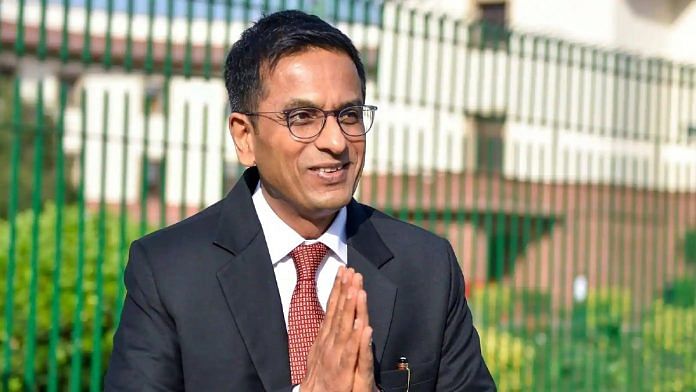New Delhi: In a bid to improve the functioning Supreme Court and to make it a more accessible institution in every aspect, Chief Justice of India (CJI) D.Y. Chandrachud has initiated “engaging” and “collaborative” measures to bring about the necessary reforms in the institution.
Within a month of taking over the reins of India’s top judiciary, CJI Chandrachud set-up two committees — one to suggest much-needed changes in the existing process from filing to listing of judicial matters and the other to improve accessibility of the SC.
Known for using technology as an effective tool for dispensation of justice, the CJI has taken yet another step to make the registry working paperless. Work is on to develop a portal to mark online appearances for lawyers who argue their cases in the top court.
Under the current practice, lawyers mark their appearances on a piece of paper, which is then handed over to the court staff. It is, thereafter, that the lawyer’s name is reflected in an order sheet of a case.
Apart from this, the CJI also got the Supreme Court mobile application updated to allow government law officers and ministries to easily know the status of their cases. This new feature in the mobile app makes it easy for the government officers to directly track cases and reduces their reliance on lawyers for the same.
These efforts have been welcomed by the bar, with both seasoned as well as young lawyers saying it is for the first time such engaging steps have been taken at a CJI’s behest.
Supreme Court Advocates-On-Record Association (SCORA) president Manoj Kumar Mishra said ever since Justice Chandrachud took over as the CJI, he has held regular interactions with Bar bodies that represent lawyers practicing in the apex court to get inputs on improving the working of the institution.
“He is open to ideas and suggestions and believes in ushering in changes through discussions, rather than imposing them on the bar,” Mishra said.
Soon after he took over as the CJI on 9 November, Justice Chandrachud held consultations with his fellow judges on the format to be followed for listing of cases. Soon, thereafter, he issued instructions to the SC registry that all 13 benches will hear 10 transfer petitions related to matrimonial disputes and an equal number of bail petitions to reduce pendency of cases. This resulted in the top court achieving 209 per cent disposal rate in the last two weeks.
But realising that there were more stakeholders whose views could be accommodated to make the functioning more efficient, CJI Chandrachud constituted a committee under Justice Sanjay Kishan Kaul — who is the next senior judge after the CJI — to hold the first ever hackathon in the Supreme Court.
A source in the SC registry told ThePrint that the purpose of having a Hackathon is to explore innovative ideas and practical propositions to refine and to bring more efficiency in the way the top court works.
This brainstorming exercise will not be restricted to lawyers only, but will also include officials working in the SC registry as well as law clerks deputed in the residential offices of judges. All the participants will have to submit their suggestions online between 24 and 30 December.
Eighteen best innovative ideas will be identified and opportunity will be accorded to give their presentation for demonstrating their vision, the source said.
To incentivise the participation, the top court also plans to felicitate the first rank holder and runner up of the Hackathon.
A separate “accessibility committee” has been set-up to carry out a comprehensive accessibility audit of the Supreme Court premises. Chaired by Justice Ravindra Bhat, this panel’s audit will extend to both physical and technological accessibility of the top court.
As per the CJI’s mandate, the survey for this audit should not just include lawyers, but also litigants who are differently abled and face accessibility problems in the top court. The committee shall also include a professor from National Law University, Bengaluru, a differently abled SC employee and a disabled advocate nominated by the Supreme Court Bar Association (SCBA). After its audit, the panel will recommend proposals to remove barriers for the benefit of the differently-abled.
Giving details of the two initiatives, SCBA secretary Yugandhara Pawar Jha said this shows that the CJI is cognizant of the difficulties faced by the legal community as well as the public in accessing the country’s top court.
After Justice Chandrachud took over as the chairman of SC’s e-committee, the panel developed programmes to make the working of the top court paperless. Now, as the CJI, he directed the creation of a new portal to let advocates mark their appearances online. This environment-friendly step will save about two lakh papers per annum.
Speaking on this new procedure, Mishra disclosed that the CJI took the decision on advocate appearance portal after holding discussions with SCORA officials. “The present system of marking appearance on pieces of paper is cumbersome as well as prone to misuse. In many cases, advocates who do not appear in court include their name in the appearance list only to raise a bill towards their client,” the SCORA president added.
SCBA president Vikas Singh also lauded the new initiatives. “Though they are still at an experimental stage, but are definitely good ones,” the senior advocate told ThePrint.
With the updated version of SC’s mobile app, law officers as well as nodal officers of central ministries and departments will be able to view the status of their cases, orders and other relevant information. The new version will provide real-time information not just on the final decisions, but also orders on interlocutory or miscellaneous applications. Moreover, the copies of the applications and documents e-filed by the other party will also be available on the app.
(Edited by Tony Rai)
Also Read: DY Chandrachud, liberal judge who made history by consigning his father’s legacy to archives



